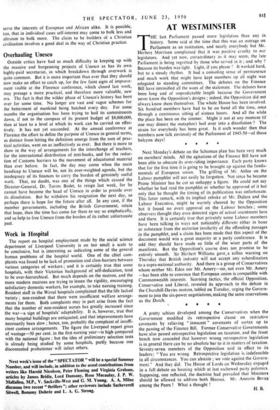Overhauling Unesco
Outside critics have had as much difficulty in keeping up with the massive and burgeoning projects of Unesco as has its own highly-paid secretariat, in which breakdown through overwork is quite common. But it is more important than ever that they should now make an effort to catch up, for the few faint signs of improve- ment visible at the Florence conference, which closed last week, may presage a more practical, and therefore more valuable, new era. The fact is that the wilder phase of Unesco's history has been over for some time. No longer are vast and vague schemes for the betterment of mankind being hatched every day. For some months the organisation has been trying to boil its commitments down, if not to the compass of its present budget of $8,000,000, then at least to a level at which its work can be carried• on effec- tively. It has not yet succeeded. At the annual conference at Florence the effort to define the purpose of Unesco in general terms, as distinct from letting the definition emerge from the sum of prac- tical activities, went on as ineffectively as ever. But there is more to show in the way of arrangements for the interchange of teachers, for the international distribution of text-books, and for the reduc- tion of Customs barriers to the movement of educational material than ever before. In fact, the day may come when the main handicap to Unesco will be, not its over-weighted agenda, but the inadequacy of its finances to carry the burden of genuinely useful work. That, no doubt, was one of the things which caused the Director-General, Dr. Torres BOdet, to resign last week, for he cannot have become the head of Unesco in order to preside over its dissolution. But he withdrew his resignation the next day, so perhaps there is hope for the future after all. In any case, if the member governments, including the British Government, retain that hope, then the time has come for them to say so emphatically, and so help to free Unesco from the burden of its rather unfortunate past.


































 Previous page
Previous page